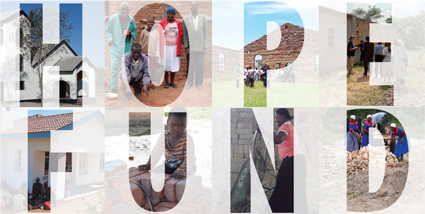
Hope Fund (3)
By Melisssa Lauber
UMConnection Staff

Hope inspires. Hope heals. Hope transforms. In the Baltimore-Washington Conference, hope recently helped to build 23 churches and parsonages in Zimbabwe.
In 2006, the Baltimore-Washington Conference embarked on a $1 million fundraising campaign. Two hundred thousand dollars went to help rebuild Mississippi churches damaged by Hurricane Katrina; $200,000 benefitted the World AIDS Fund, and $600,000 was raised “to fortify our partnership with those in dire need in Zimbabwe.”
By 2009, all the funds were collected. During Phase 1 of the Hope Fund, from 2009 to 2012, nine projects were completed. One project, the Shamva Parsonage, was carried over into this year. Thirteen Hope Fund projects were completed during Phase 2 this year. This fall, the roof was put on the sanctuary of Gwese UMC, one of the final Hope Fund projects.
The Hope Fund encouraged churches to complete as much as they could on their own. Many of the churches molded their own bricks. Assistance for the final stages of the building was delivered by the Baltimore-Washington Conference.
 In addition to these Hope Fund projects, the Baltimore-Washington Conference provided $100,000 to finance the first phase of a comprehensive Broadband Internet project to bring an infrastructure to communications ministries in the country.
In addition to these Hope Fund projects, the Baltimore-Washington Conference provided $100,000 to finance the first phase of a comprehensive Broadband Internet project to bring an infrastructure to communications ministries in the country.
The United Methodist Church in Zimbabwe has 66 institutions, which include hospitals, clinics, schools and district offices; 42 of these have no access to the Internet. The Broadband project brought electronic access to many of these institutions in the form of selfsustaining Internet cafes.
Members of the conference also shared in the labor of building churches, parsonages, clinics and schools.
Many BWC Volunteer in Mission teams visited to help construct buildings and create relationships with United Methodists in Zimbabwe.
“It really is about the partnership,” said Jim Gourley of Nichols Bethel UMC in Odenton who, during seven trips, spent 13 months during the past four years as an Individual Volunteer in Mission in Zimbabwe coordinating the Hope Fund projects.
Gourley, who retired from the Navy, became devoted to ministry in Zimbabwe at the 2007 annual conference, when he heard two women from Community UMC in Crofton talk about delivering sewing machines to women in Zimbabwe. It touched his heart and he answered an altar call to “go and help.”
Political turmoil and violence in Zimbabwe deterred his departure until 2009. On his first trip, he went for fiveand- a-half months, by himself, living in a small cottage, often spending the evenings sitting by candlelight because there was no electricity.
Zimbabwe, he explained, is the second poorest country on earth. One in four children has been orphaned by AIDS and there is much need. But Gourley also found exceptional faith in the people he encountered.
He worked with the bishop and other United Methodist leaders in Zimbabwe, assessing needs, getting estimates, project managing and also helping to build.
He confessed he didn’t know “which end of the hammer to hold” in 1996 when he retired from the Navy and began volunteering with Habitat for Humanity.
“Our presence, just our simple presence, there is so important,” he said. “We vow to give the church our prayers, presence, gifts and service. Jesus tells us to go out into the world and work among all his people. We’re commanded by our Lord to go and try to do something. At this point in my life I’m still physically able.”
According to Gourley, “the Hope Fund helps us put our wants and words into action.”
Now that the 23 churches and parsonages have been completed, Gourley hopes the partnership the Baltimore-Washington Conference has with Zimbabwe will begin to shift to address educational and medical projects, which he believes are areas in which the church can reach the largest numbers of people. “Eds and meds” is what the Rev. Joseph Daniels, chair of the BWC Zimbabwe Initiative, calls this approach.
On Oct. 11, Gourley returns to Zimbabwe and will work in ministry there through Dec. 15. While his mission is self-funded, he has raised more than $5,000 from his congregation. He hopes to see it put to good use at rural medical clinics in Mutare.
“All those people who gave their nickels and dimes and all those who gave thousands of dollars to the Hope Fund ought to know what their money has gone toward,” he said. “The Bible says God will provide. With the Hope Fund, we got to participate in that provision.”

Login/Register to leave comment